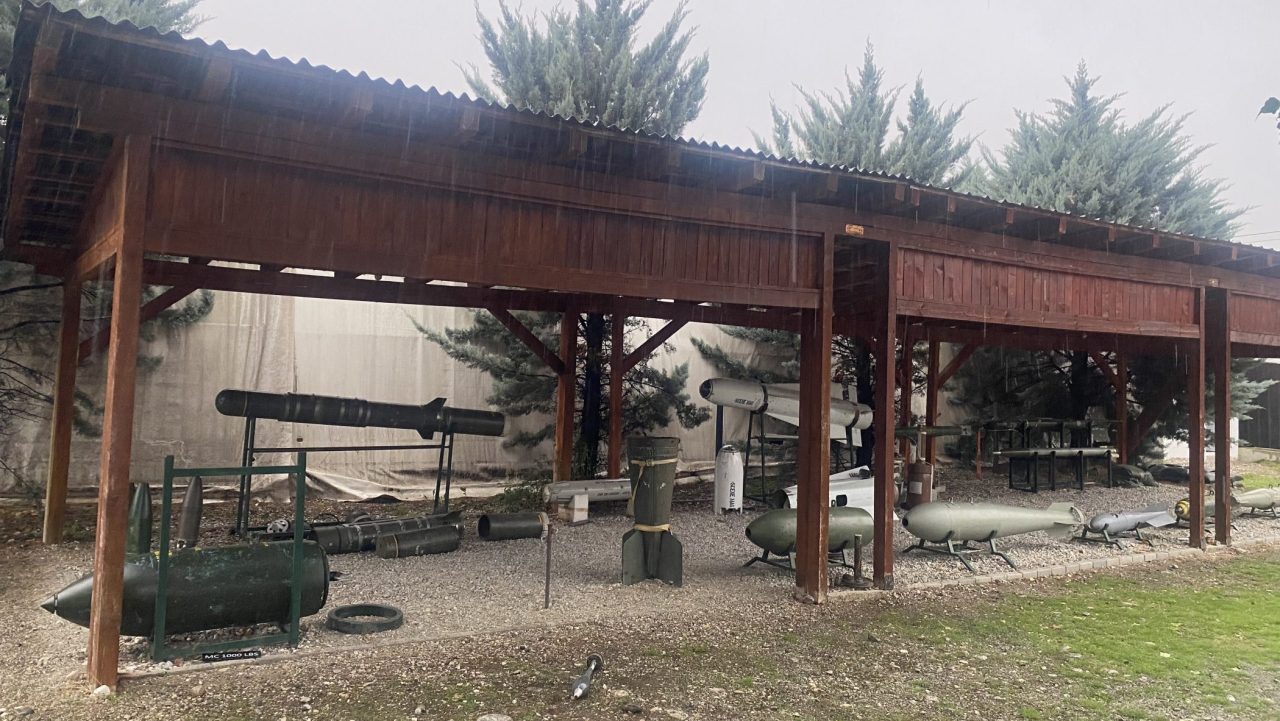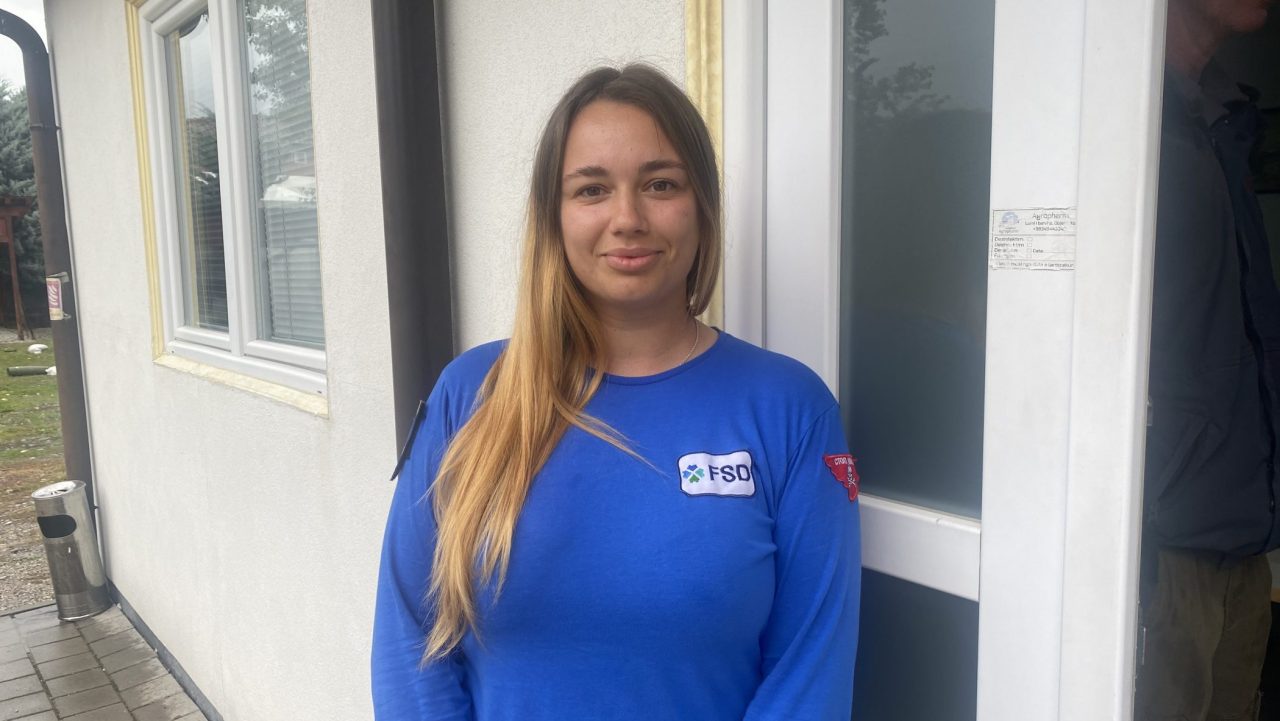This post is also available in: Bosnian
Since 2010, MAT Kosovo has trained more than 3,000 demining specialists, but it now focuses on working with Ukrainians. It has even engaged two Ukrainian interpreters on its staff to ensure proper translation during its four-week courses.
More than two years since Russia’s full-scale invasion, Ukraine is one of the countries with highest density of mine-contaminated territory in the world. According to various estimates, 30 to 40 per cent of the country, up to 180,000 square kilometres, is contaminated with explosive devices – an area greater than the whole of Bosnia and Hezregovina. Forests, fields and populated areas are all potentially dangerous.
MAT Kosovo manager John Doone, who previously served with the British Army, said that 200 Ukrainians have already been trained here. When asked when the demining of Ukraine could be completed, he replied that it could take at least three generations.
“I tell the Ukrainians undergoing our training that the demining of your country will be completed by your grandchildren,” Doone said.
In the classrooms at MAT Kosovo are models of various explosive devices, produced in different countries and at different times. In the yard, there are dugouts imitating real conditions, examples of defensive facilities that needed to be demined, models of guided and unguided missiles, as well as a demining practice area.
There is also a kennel for the canine deminer Sonic, a Kosovo counterpart to Ukraine’s well-known deminers’ dog Patron. Before being trained to help in the demining process, Sonic was an ordinary street dog. However, according to the Kosovo instructors, dogs can learn to detect explosive devices in just a few months of continuous training, and for the most part, it doesn’t matter what breed they are.
According to the trainers, studying demining in Kosovo has advantages – typical post-war terrains have been preserved in some places, which is not the case in other countries. Special training also takes place in the mountains of Montenegro.
People in Kosovo also have experience from the 1990s war. The demining of Kosovo’s own territory is only now coming to an end, despite the fact that the war ended 25 years ago.
It is predicted that Kosovo will only receive in 2025-26 the status of a landmine-free country. This means that it still has many specialists with excellent theoretical knowledge and practical skills in demining, and there are several private schools for the training of deminers like MAT Kosovo.
‘Ukrainians are persistent’
 MAT Kosovo. Photo: Iryna Synelnyk
MAT Kosovo. Photo: Iryna Synelnyk
When Ukrainian journalist visited in September, a large group of Ukrainians, women and men of various ages and former professions, had been undergoing training there for a third week; many were motivated by the desire to be useful back home.
The training for deminers at MAT Kosovo combines theoretical studies and practical skills to ensure participants reach international standards. “Everyone is different – someone understands the theory better, others are more capable in practical skills. But demining requires both theory and practice equally,” stressed one of the trainers, Charles, who all the students call Charlie.
A four-week course at MAT Kosovo costs 6,500 euros, including accommodation and food. The fees are paid by international organisations that support Ukraine.
During a 15-minute break between classes, one of the school’s students, 26-year-old Anna from the Ukrainian city of Chernihiv, explained how, in February 2023, she joined an international organisation dealing with demining activities in Ukraine.
Before starting with her job, she underwent training, passed tests and exams. She has already managed to work in various facilities in the Chernihiv region – in the villages of Lukashevka, Yahidne and Shestovitsa, which were temporarily occupied by Russian forces, as well as other regions of the country.
She said that in Kosovo, she has had the chance to improve her knowledge. “Very interesting, professional instructors, this training will raise my professional level,” she said.
In addition to their skills, she explained, deminers need persistence and endurance, because demining is a very tedious process.
Speaking of dedication to the task, instructor Charlie praised his Ukrainian students.
“I have worked with people of various nationalities, but I have grown to love Ukrainians the most. They are persistent, and some even train after classes,” he said.
One of the deminers, 34-year-old Oksana from the city of Rivne, said she is also involved in conservation and environmental protection, and during the war has been collecting information about environmental pollution caused by the conflict. She has now become a deminer and said her family is proud of her decision.
“Demining is a slow process, depending on the type and density of contamination with explosive objects, and the existing vegetation. But in general, it is a very quiet business,” Oksana explained.
She said that demining procedures are strictly regulated, stage by stage. “A housewife in the kitchen can be in greater danger than deminers, because there are many rules that protect us,” she said.
She added: “I am convinced that I am safe, because I take responsibility for my work, and so do my colleagues.”
One of the professional interpreters working with the Ukrainians at MAT Kosovo trainers is Yevheniia Sukhonos from the city of Sumy. During the war, she decided that she wanted to interpret for the army, and initially, as a volunteer, she helped international organisations by translating from Ukrainian to English.
She said that she could have stayed in Kyiv, but thinks it is more important to be working with the deminers in Kosovo.
“People who are already working or will work as deminers come here for training. Here I feel more like I’m doing something useful,” she explained.
Deadly hazards in Chernihiv
According to the main directorate of the State Emergency Service in Chernihiv Oblast in northern Ukraine, in 2023, 18 people were killed by explosive devices in the region.
In one incident last year, a car carrying four local residents hit a mine in the woods near the village of Shestovytsi near Chernihiv. All of them were killed. According to police, they ignored a temporary ban on going to forests dure to the dangers of mines, and went to pick mushrooms.
Four people were also injur by landmines while working in the fields in the Chernihiv region.
Kosovo’s experience can be useful

While one group of trainees and the interpreter continued to work on their task outside, in the classroom, another group was mastering techniques of neutralizing explosive devices.
Among those being trained was Vasyl Polyvaniuk, a professor at the Department of Tactical and Special Training of Dnipro State University of Internal Affairs, who is also a retired police colonel.
Polyvaniuk said that this training was important to him so he can pass on the knowledge to cadets in the future, because police officers are the first to arrive at the scene of an incident, and therefore need to be able to identify explosive devices.
“They should understand whether it is an explosive substance or not in order to then call representatives of the State Emergency Service or the army, which deal with the elimination of unexploded ammunition,” he explained.
For Polyvaniuk, the format of the training is also interesting, given that he is a tactical police training instructor. He is convinced that Kosovo’s experience can be useful for Ukraine after the deoccupation of territories that will be heavily contaminated with explosive devices. One of the key pieces of advice is not to wait for the end of the war to start the demining process, but to take immediate action.
While Polyvaniuk was assembling a guide system for ammunition detonation, instructor Charlie came to see the participants’ progress in the classroom, “magically” speaking in some Ukrainian, which he has been learning online after coming to Kosovo to teach demining.
Outside the classroom is a memorial plaque to Dmytro Yershov, a Ukrainian who also studied at MAT Kosovo.
After the war started, Yershov returned from Sri Lanka, where he was a surfing instructor, to defend his hometown of Chernihiv. In July 2022, his car was blown up by an enemy anti-tank mine near Izyum in the Kharkiv region.
Yershov was the only one who survived while four of his colleagues were killed. However, in December 2023, he died of complications from the injuries he sustained in the blast.
On her way out, Ukrainian journalist was told that Yershov’s sister also plans to go to a demining school – the very same one as her brother, MAT Kosovo.

